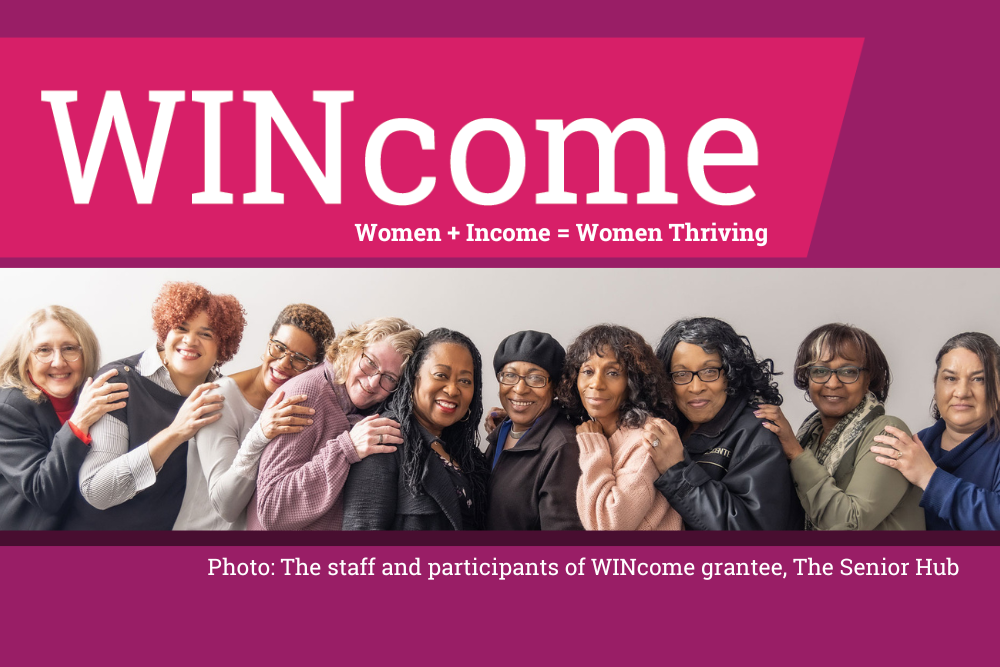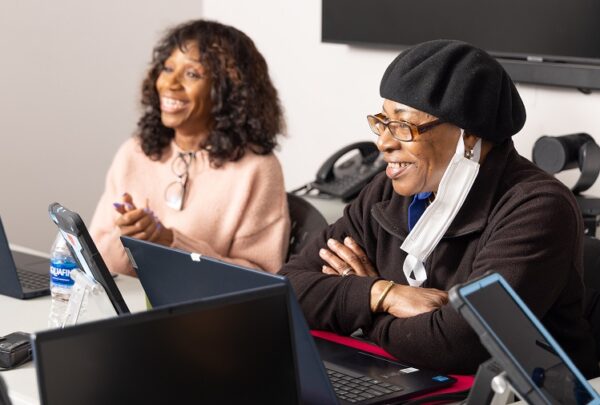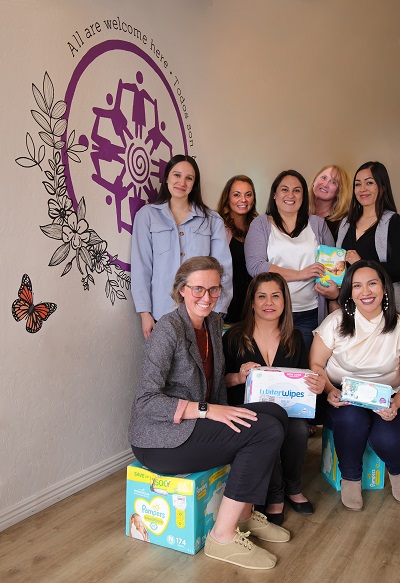
WINcome Grantmaking Year One Results
WINcome Grantmaking Fills Trust, Financial Gaps for Colorado Women
Americans – Women Especially – Are Short on Cash for A Crisis. WINcome Is Making A Difference.
According to the 2022 Economic Well-Being of US Households report released by the Federal Reserve this month, only 63% of adults say they can cover a hypothetical $400 emergency expense exclusively using cash or its equivalent – down from 68% in 2021. It’s a stark reminder of the fragility of many families’ finances.
In Colorado, given that the wage needed to meet basic needs increased 124% from 2001 to 2022 while median earnings only grew 64%, this news seems obvious. What may not be as obvious is that women likely make up the majority of these adults. Women lead 80% of single-parent households while also also being paid less than their counterparts who are men, especially women of color. While working hard to make ends meet or struggling to navigate unexpected expenses, it is especially hard for women to dedicate time and resources to pursue their goals for financial security and shape their own futures.
Our WINcome Grantmaking Program Is Creating Change Through Transformational Trust
Affording an emergency expense is just one thing The Women’s Foundation of Colorado is addressing with our WINcome (Women + Income = Women Thriving) grantmaking program. In addition to helping women mitigate crises that can upend their financial progress, WINcome also helps women meet economic security goals. At times, this means using flexible cash assistance offered through WINcome, giving women room and agency to direct their funds to what makes the most sense for them and their families.
 WINcome, now in its second year, is built upon transformational trust. Through 13 direct-service grantee partners, we offer flexible cash assistance and access to resources for women to meet basic needs, mitigate crises, and achieve economic security goals. With six public policy grantees, we build equitable systems so women and families can thrive.
WINcome, now in its second year, is built upon transformational trust. Through 13 direct-service grantee partners, we offer flexible cash assistance and access to resources for women to meet basic needs, mitigate crises, and achieve economic security goals. With six public policy grantees, we build equitable systems so women and families can thrive.
Our country’s social safety net for families living in poverty is not built on trust, but on rigid requirements, such as working, going to school, or seeking employment – to remain eligible. Additionally, programs such as WIC and SNAP provide only partial assistance by covering some essentials items but not all, such as diapers, hot food, pet food, medicine and vitamins, and toilet paper. Government support systems are rooted in a false narrative that people won’t make good choices, thereby building inflexible systems and making the application process onerous to navigate.
“Through WINcome, The Women’s Foundation of Colorado is filling a trust gap as much as we are filling a financial gap,” said Louise Myrland, vice president of programs.
How WINcome Funds Are Used by Grantee Partners & Participants
In 2022, WINcome grantees received more than $900,000 through WINcome. Part of each grant offers unrestricted funding to our grantee partners to execute their programs as needed. The rest of each grant is “restricted” for cash assistance, which, ironically, is wholly unrestricted. In 2023, The Women’s Foundation granted just over $1 million to WINcome grantee partners.
In the first year, evaluation partner Point b(e) Strategies determined that although 1,600 individuals were served by grantee partners, more than 15,400 individuals were reached, demonstrating that the entire family benefits from cash assistance to women. A diverse group of women made up the 1,600 individuals, including Black, Indigenous, and women of color; many age groups; low-wage workers; women with disabilities; non-binary and transgender individuals; immigrants and refugees; women facing eviction or who are unhoused; and women of color entrepreneurs who rely on their own businesses as their main source of income.
Outcome #1: Women progress toward reaching their goals regarding economic security
96% of participants reported a positive impact of cash assistance and program participation on meeting personal economic security/resiliency goals. Goals of participants included:
- building, advancing, and obtaining careers
- stability
- accomplishments and advancements for personal business
- saving money
- pay off debts and loans
- complete or go back to school to then build a career
WINcome grants make it possible for women to progress toward their goals, unlocking freedom to define their futures.
Outcome #2: Increase access to economic opportunities & services for women, including access to child care, education, and job training
94% of participants stated cash assistance from a grant partner helped them to access economic opportunities they couldn’t otherwise access. For example, women entrepreneurs working with grantee partner Community Center for Wealth Building acquired kitchen equipment and supplies for their catering businesses.
 Outcome #3: Women’s basic needs are met and crises are mitigated
Outcome #3: Women’s basic needs are met and crises are mitigated
A crisis or emergency looks and feels varied for each woman, individual, and family. Participants used cash assistance to help with various expenses for various reasons, including unplanned expenses, off-setting lost income, off-setting lost benefits, and easing financial pressure. Dispelling the myth that people won’t make good choices with cash assistance programs, the most common uses of cash assistance through WINcome included:
- food (604 participants)
- transportation (458)
- rent or mortgage (185)
- clothing (160)
In addition, grantee partner The Gathering Place reported that about half of their clients used the funds to obtain vital documents, while grantee partner The Senior Hub revealed the most common use of cash assistance was to cover health insurance copays for themselves and their dependents.
In addition to the financial support, participants reported that receiving cash assistance made them feel less stress and anxiety, increased motivation, and feeling valued.
“It’s a ‘real deal’ program,” said Cheryl, a participant who is gaining remote caretaking skills with other women over 50 years old through The Senior Hub, as well as accessing flexible cash assistance. “When you know someone is investing in you, it changes how you see yourself.”
Outcome #4: Develop women’s skill to stabilize and become economically resilient
While it was not an expectation of the WINcome program for grant partners to focus on skill building, several direct service grant partners offered programs and services related to building economic security and resiliency through personal and or business skills in addition to cash assistance.
92% of participants reported they had more resources to develop skills, while 85% said because they received cash assistance, they have more time to focus on becoming economically secure.
Outcome #5: Priority policy & systems change issues are identified that center those most impacted
To better understand the most important issues within various communities served, several direct service grant partners asked participants to share the issues that matter most to their economic security and resiliency. 83% of the public policy respondents agreed that their organization has meaningful opportunities to listen directly to women. Among the top answers were housing, employment, transportation, and business sustainability/growth.
“Throughout the year, we conducted many different listening sessions to help inform our economic security policy agenda,” said a staff member of grantee partner Colorado Center on Law and Policy.
Outcome #6: The Community is informed about public policy and systems change issues related to economic security and solutions for women, women of color, and women with disabilities
Public policy grantee partners held various meetings, events, and opportunities to inform and engage community members, including policy makers, about issues related to the economic security of women. They held more than 200 meetings with more than 2,000 attendees. In addition, more than 1,000 community members participated in community organizing efforts to address issues related to the economic security of women.
“While policymakers may understand the issues we target, they may not have a full understanding of the urgency of these needs, the public momentum or will, or the perspectives that each independent advocacy organization brings in order to energize legislation on their own,” reported staff from grantee partner Colorado Children’s Campaign.
Outcome #7: Narratives related to women speak to and address systems change issues impacting women, women of color, and women with disabilities
80% of grantee partners noted they have seen an increase in narratives around women speak to the need for systems change.
“The pandemic and the coverage around some of the issues related to the pandemic did shed more light on some of the systemic issues women are encountering. Unfortunately, it feels like that window is closing, with less attention being paid to caregiving and other areas that were focused on previously,” stated a staff member of grantee partner Bell Policy Center.
Outcome #8: Organizations supporting gender, racial, and economic equity are better resourced to do their work
Grant partners were asked the impact of the WINcome grant on their organization. The following themes emerged:
- freedom and flexibility to meet needs while validating the work of organizations and their clients
- supported more opportunities to center and serve BIPOC and marginalized communities, women, and families
- helped launch new programs
- strengthened partnerships and peer learning that lead to systems change
“The grant has been critical in our ability to launch the only nonprofit immigration legal service program in Northern Colorado,” reported staff from grantee partner Alianza NORCO.
“The greatest impact has been the freedom to meet the needs of our clients, without having to force clients to jump through a million different hoops…the direct cash assistance gives clients the dignity and freedom to decide where the money can be the most useful and impactful in their own lives,” claimed The Initiative.
Learning About Flexible Cash Assistance Through A Community of Practice
In the summer of 2022, The Women’s Foundation of Colorado joined the co-convening team for the Colorado Direct Cash Transfer Community of Practice (CCOP). Inspired by the national Guaranteed Income Community of Practice that is spearheaded by the Economic Security Project, this Colorado-specific community of practice regularly gathers various direct cash stakeholders, including Colorado direct cash pilots, interested nonprofit organizations, governmental entities, public policy advocacy organizations, and community participants in direct cash pilots. We are learning and helping the Colorado community to learn more about the history of direct cash efforts in the country, key decisions direct cash pilot administrators need to make in their design process, and evidence supporting the direct cash movement.
A branch of the CCOP, the Benefits Cliff Working Group, dives deeper into understanding and mitigating benefits cliff effects on direct cash and flexible cash assistance program participants. This is when a woman receives a pay increase and then experiences a sudden drop off in public benefits, such as SNAP, resulting in her being worse off financially than before the pay increase.
WFCO is leading the co-convening effort on the new Public Policy Working Group branch of the CCOP, which will start in the summer of 2023. WINcome grant partners actively engage with the CCOP and its branch working groups, and WINcome grant partners are providing input on the design of the CCOP.
Read the entire WINcome evaluation report.
Photo #1: Participants of The Senior Hub at a remote caregiving training.
Photo #2: Staff and program participants at Full Circle of Lake County.
Photos by Katy Tartakoff.

